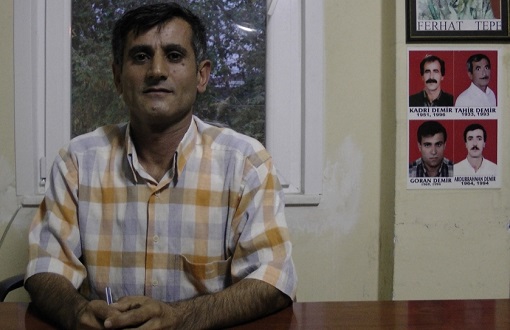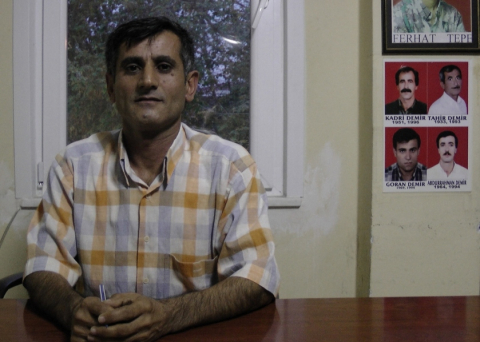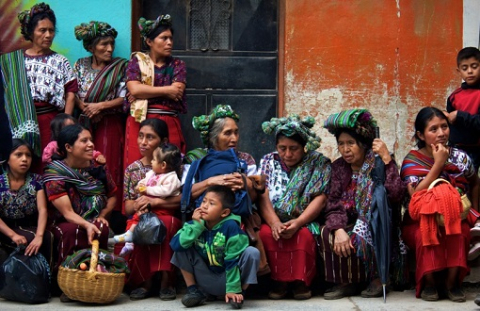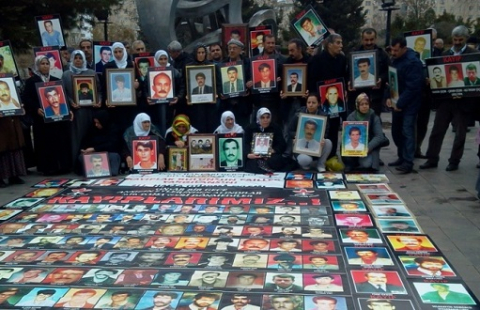
"I’ve lost four members of my family, but I’m still hopeful"
 Interview by Emrah Gürsel The victims of unresolved murders, extrajudicial executions, and the policy of disappearance carried out at the hands of state officials has been repeated thousands of times over. Given that the state has not accepted its responsibility and that the necessary steps have not been taken, one would expect that there would be hundreds of civil society organizations working for the rights of the relatives of the victims. However, the number of institutions that work on these problems is very low, as a result of which an incredibly heavy load falls on the shoulders of existing institutions. Velat Demir is the president of YAKAY-DER, one of the most important institutions in this field.
Interview by Emrah Gürsel The victims of unresolved murders, extrajudicial executions, and the policy of disappearance carried out at the hands of state officials has been repeated thousands of times over. Given that the state has not accepted its responsibility and that the necessary steps have not been taken, one would expect that there would be hundreds of civil society organizations working for the rights of the relatives of the victims. However, the number of institutions that work on these problems is very low, as a result of which an incredibly heavy load falls on the shoulders of existing institutions. Velat Demir is the president of YAKAY-DER, one of the most important institutions in this field.
YAKAY-DER went to Geneva on 30-31 October for a work visit organized by FEMED, which is a federation composed of institutions established by the relatives of the disappeared in the Europe-Mediterranean zone. Velat, who went to Geneva representing YAKAY-DER, brought the files of 150 cases of disappearance and met with international organizations. [1] They convened meetings with, notably, the UN Working Group on Enforced or Involuntary Disappearance (WGEID), as well as with the International Committee of the Red Cross, the Human Rights Committee, the Permanent Representative of France, the Committee Against Torture, the Special Rapporteur on human rights defenders, and the International Coalition Against Enforced Disappearances (ICAED). We met with Velat Demir in YAKAY-DER’s office in Fatih, Istanbul, following his trip.
Velat, first of all, thank you for agreeing to speak with us. We’re curious about what you did on your recent visit to Geneva, could you explain a little bit? We have been working with FEMED since 2006. FEMED and organizations connected to it held a two-day visit for the purposes of meeting with the UN Working Group on Disappearances and other institutions and organizations in Geneva. The Red Cross was also among these organizations. We shared information concerning rights violations that occurred in the past. This information, of course, is not just the result of YAKAY-DER’s documentation efforts, but also of efforts by İHD, Mazlum-Der, and many other organizations. Various institutions and officials have claimed that there are over 17.500 unresolved murders in Turkey. We know that in a 24-year time span, nearly 600 children were murdered in Turkey. Most of these children lost their lives in mine fields, as they were playing ball or feeding animals in the mountains. The evidence that we have collected from the press and various civil society organizations illustrates that, since 2002, when AKP came into power, 186 children have died. So the information that you brought to the meeting concerned which human rights violations? First of all, we brought the files of 150 cases of disappearance that we have translated from Turkish into English. Disappearances from which era? They were related to the disappearances that occurred between 1990 and 1994. Predictions of the number of disappeared range between 850 and 1.300. Different figures are given because in Turkey there has not yet been a joint effort among civil society organizations to develop a database. Some say 500, some say 5.000 people. We think this is a big shortcoming. We have also spent most of our time on mass graves. Although we cannot be entirely certain, today we can say that there are nearly 300 mass graves. We want to conduct scientific projects like those done in Argentina, Morocco, and Bosnia in order to open the mass graves with bulldozers, to take them into protection, and to keep from losing the evidence, in line with the Minnesota protocol. What exactly are the demands that came from the organizations you met with aimed at accomplishing? Some steps were taken toward changing the September 12 Constitution; some changes happened. But for our purposes, we stated that this was not enough. There is still the problem of impunity and the 20-year statute of limitations. The cases of the people murdered in the 90s are about to collapse. We won’t be able to subject these sorts of murders or injustices to the process that we have initiated with the September 12 Constitution. Their path to the court seems invisible. The most concrete example of this was how Kenan Evren was judged and to what degree our claims for rights were reflected. Let me elaborate. During the term of the former General Director of Security, Mehmet Ağar, from 1993 to 1996 alone, we determined that there were nearly 850 incidents of unresolved murder and disappearance. Ağar was punished, but not because of this. He is currently being held in a high security prison. He was given what seems to us a ridiculous conviction of two years. Beneath all of this lies the constitution of the military dictatorship. There have been many positive developments but we do not think that they are enough. While some of the conflict situations in other countries seem to be, in comparison to Turkey, in a more resolved state, in others, the conflicts continue. The first that come to my mind are Morocco, Cyprus, Bosnia-Herzegovina, and Kosovo. When you compare these cases to Turkey and the Kurdish question, what sorts of differences are there between them? Are we further behind in terms of resolving the problem? The question you’re talking about has had a big impact on me. I attended a conference by ICAED. I developed some impressions there. There is a lot missing from civil society organizations in Turkey. The same thing has certainly occurred in other countries, but some steps have also been taken. The current reigning king of Morocco, Muhammed IV, changed the names of streets in order to address the human rights violations that occurred under the reign of his father, Hasan II. In Turkey, however, the families of the disappeared were invited to Dolmabahçe Palace in 2011. The Prime Minister picked just one of these cases; not too much came out of it. There is still state continuity. We are speaking to the state. In the international cases, the ideas and recommendations of the families of victims are taken into consideration when establishing a truth commission. Unfortunately, in the country in which we find ourselves, a sub-commission was founded in parliament under the command of political parties. Although we have been working in this field since 2001, nobody has asked our opinions or ideas. Even if the current government confronts the human rights violations not experienced under its rule, even if it takes steps concerning them, though it won’t have a very big effect, but instead will create a positive atmosphere. The government would be praised both internationally and domestically, from Kurds, Alevis, and other oppressed groups. Could this be one of the reasons that they haven’t done so? That definitely has an effect. But we approach it from a different perspective. Look, in 2007, the UN’s Convention Against Disappearance appeared. Unfortunately, that hasn’t even been signed. By signing the convention, the disappeared people in Cyprus will be accounted for; the state of the girls who disappeared in Dersim will come to light, and the realities of the Armenian deportations will be revealed. These all lie beneath the resistance to signing the convention. Is there anything you want to add… We also have difficulty with the Institution of Forensic Medicine. In contemporary, modern countries, the Institution of Forensic Medicine isn’t made up of only three people; it’s made up of universities, of independent boards. We are concerned that the Institution of Forensic Medicine is linked to the Ministry of Justice. What kind of structure do you recommend? First of all, we want it to be linked to the Ministry of Health. It must be implemented with a structure composed of universities, experts, and civil society organizations like TİHV (Human Rights Foundation of Turkey). When one party becomes the majority and appoints people close to its ideology and philosophy, the project cannot be scientific. We believe the project that would be carried out there could not be scientific. With the KCK operations that started in 2009, many members of civil society organizations, journalists, and students who are Kurdish are currently in prison. The operations have had an impact on you as well. Some members of YAKAY-DER whom we know are currently in prison. How many of your people are currently in prison? How does this situation impact your work? The AKP was a new government. They were inexperienced. Without a doubt there was much anguish during the rule of Çiller and of Demirel. However, this government has done the things that happened in the past in a different way. Nearly twenty activists who work generally in Turkey on disappearances, unresolved murders, and mass graves have been arrested. On 4 October 2011, two of our directors, Cemal Bektaş and Selahattin Tekin, and two of our members, Kemal Aydın and Zekiye Anık, were arrested. Recently, Zekiye Anık was released by the court pending a trial. Currently, three of our colleagues are in prison. As I said at the beginning, the government has not accepted taking steps toward the past, nor has it signed several conventions. By preventing our colleagues who are conducting projects on these issues, they aim to stonewall efforts at sharing documents with the world and Europe and circulating this information with the public. The approach of, “Well, I’m going to solve this problem. Whether you like it or not I’m going to research them with some people I’ve organized and with the sub-commission I established in parliament. I cannot accept someone else’s efforts to document these problems and share them with the public.” This was the basic goal. Our colleagues were arrested with flimsy evidence and a copy-paste logic. None of our colleagues have ever participated in any illegal activities. In the accusation, actions like attending the Saturday Mothers’ commemoration at Galatasaray Square, visiting a political party, and using the word “martyr” in their petition to intervene in the Ergenekon case, are considered crimes. Our friends are in prison for false charges. Has the situation reached a point where it will go toward something like hunger strikes? We don’t want the suffering to get any larger. We don’t want to get the news from prison that one of our colleagues is dead. Because the families have not yet met with their relatives we don’t currently have any information. We hope that the suffering of the past and those that continue come to an end as soon as possible. We shall live in a democratic country based on human rights. YAKAY-DER will be successful in their efforts. Call it an accident or call it organized, but so much has happened in this country. I’ve lost four members of my family. But in spite of it all, I’m still hopeful. As the families and individuals who have lost relatives, we must meticulously and patiently pursue truth and justice. By embarking from the experiences around the world, we are not approaching from the desire for revenge. We aspire for a Turkey that is prudent, conscientious, and scientific, for the democratic and modern country that we could not live in for the future generations of all the peoples that live in Turkey. A country where everyone can live with their religion, language, dress, and song… This will happen. For us, “hopelessness” is an indescribably word. We are hopeful.
for; the state of the girls who disappeared in Dersim will come to light, and the realities of the Armenian deportations will be revealed. These all lie beneath the resistance to signing the convention. Is there anything you want to add… We also have difficulty with the Institution of Forensic Medicine. In contemporary, modern countries, the Institution of Forensic Medicine isn’t made up of only three people; it’s made up of universities, of independent boards. We are concerned that the Institution of Forensic Medicine is linked to the Ministry of Justice. What kind of structure do you recommend? First of all, we want it to be linked to the Ministry of Health. It must be implemented with a structure composed of universities, experts, and civil society organizations like TİHV (Human Rights Foundation of Turkey). When one party becomes the majority and appoints people close to its ideology and philosophy, the project cannot be scientific. We believe the project that would be carried out there could not be scientific. With the KCK operations that started in 2009, many members of civil society organizations, journalists, and students who are Kurdish are currently in prison. The operations have had an impact on you as well. Some members of YAKAY-DER whom we know are currently in prison. How many of your people are currently in prison? How does this situation impact your work? The AKP was a new government. They were inexperienced. Without a doubt there was much anguish during the rule of Çiller and of Demirel. However, this government has done the things that happened in the past in a different way. Nearly twenty activists who work generally in Turkey on disappearances, unresolved murders, and mass graves have been arrested. On 4 October 2011, two of our directors, Cemal Bektaş and Selahattin Tekin, and two of our members, Kemal Aydın and Zekiye Anık, were arrested. Recently, Zekiye Anık was released by the court pending a trial. Currently, three of our colleagues are in prison. As I said at the beginning, the government has not accepted taking steps toward the past, nor has it signed several conventions. By preventing our colleagues who are conducting projects on these issues, they aim to stonewall efforts at sharing documents with the world and Europe and circulating this information with the public. The approach of, “Well, I’m going to solve this problem. Whether you like it or not I’m going to research them with some people I’ve organized and with the sub-commission I established in parliament. I cannot accept someone else’s efforts to document these problems and share them with the public.” This was the basic goal. Our colleagues were arrested with flimsy evidence and a copy-paste logic. None of our colleagues have ever participated in any illegal activities. In the accusation, actions like attending the Saturday Mothers’ commemoration at Galatasaray Square, visiting a political party, and using the word “martyr” in their petition to intervene in the Ergenekon case, are considered crimes. Our friends are in prison for false charges. Has the situation reached a point where it will go toward something like hunger strikes? We don’t want the suffering to get any larger. We don’t want to get the news from prison that one of our colleagues is dead. Because the families have not yet met with their relatives we don’t currently have any information. We hope that the suffering of the past and those that continue come to an end as soon as possible. We shall live in a democratic country based on human rights. YAKAY-DER will be successful in their efforts. Call it an accident or call it organized, but so much has happened in this country. I’ve lost four members of my family. But in spite of it all, I’m still hopeful. As the families and individuals who have lost relatives, we must meticulously and patiently pursue truth and justice. By embarking from the experiences around the world, we are not approaching from the desire for revenge. We aspire for a Turkey that is prudent, conscientious, and scientific, for the democratic and modern country that we could not live in for the future generations of all the peoples that live in Turkey. A country where everyone can live with their religion, language, dress, and song… This will happen. For us, “hopelessness” is an indescribably word. We are hopeful.



